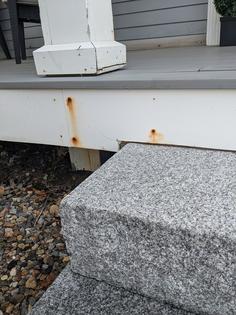Ask the Builder: Use the best exterior nails and screws
I was blessed by God to learn my craft of building and remodeling in Cincinnati. The first few years of my career had me working on houses that were close to 100 years old. I have no recollection of seeing rusty roofing nails on any of the jobs where we had to strip off roofs. I had to spackle exposed nail heads on house siding and trim, but none of them were rusty.
Today I see rust stains on houses where I live in New Hampshire. Some of these structures are less than 10 years old. I had to replace my own asphalt shingle roof a few years ago. It was only 13 years old and many of the roofing nails were rusted and badly corroded. Fasteners used on roofs should always outlast the actual roofing material.
Go back in time and you’d discover old builders and carpenters knew all about rust. This is why most, if not all, of them used double hot-dipped galvanized nails to secure any exterior product to a house. These superior fasteners worked very well for decades so long as the building was not near a body of salt water. Salt water, spray and mist will cause corrosion to steel and iron if it doesn’t have the absolute best coating of zinc. Stainless steel fasteners are the gold standard in marine environments.
Hot-dipped galvanized nails and many screws were sacrificed on the altar of speed and productivity. The nails of old I saw were nailed by hand, one by one. The nail guns used today by many carpenters don’t play well with nails that have a thick, uneven coat of zinc. This type of coating causes nail guns to jam.
You can purchase some nails for nail guns that claim to have a hot-dipped coating of zinc. I’ve used them and don’t doubt their claim, but I can tell you the coating is not anything like the old-fashioned nails that look like nails coated in a thick gray gravy.
Most nails used in nail guns have a thin zinc coating applied in either a chemical or mechanical process. Nails are manufactured in a machine that’s has a huge spool of wire that feeds into the machine. It’s much easier to chemically coat this wire with zinc than any other method.
The thin zinc coating can wear away in just a few years if you leave the nails exposed. In the manufacturing process when the wire is clipped to create the nail, bare steel can be exposed at the head and tip of each nail. This doesn’t happen in the hot dip process.
Nails dipped in molten zinc have already been created. The zinc coats all surfaces on the nail. I’ve opened a box of roofing nails to find some that are bonded to one another much like cold macaroni and cheese. That’s how much molten zinc can cling to the nails.
The bare steel nails are cleaned and chemically treated before they get dumped into a container of molten zinc that looks like silver stew. The 420-450 F temperature creates a strong chemical bond as the zinc atoms interlock with the nails’ steel and iron molecules. The resulting layer is a zinc-iron alloy.
Stainless steel nails or screws are the best fasteners to use for all exterior applications. You’ll vanquish rust from your home if you use them. They are more expensive, but you’ll never have to deal with rust stains. You’ll not lose sleep worrying if the nail or screw is corroding deep in the wood.
You must be very careful about all of the metal you use when building an exterior deck or structure that’s made with treated lumber. Today’s treated lumber can have very high amounts of copper in the wood. Copper is a natural biocide, and the fungi that cause wood rot can’t survive in the presence of copper.
All of the joist hangers, metal framing connectors, nails, bolts, screws, etc., that will penetrate the treated lumber must have a coating rated for direct contact with the lumber. Many top-quality fasteners will have labeling on the boxes to show you how much exposure they can take.
The problem arises when the treated lumber and fasteners get wet from rainfall, dew or contact with fresh or sea water. The water leaches out some of the copper into solution creating a corrosive brew. The corrosion of the metal can lead to deck collapses, causing serious injury or death.
My daughter worked with a woman in Puerto Rico who broke her neck and had to have her spleen removed when a deck she was standing on crashed to the ground without warning. Don’t think you’re immune from tragedy like this.
You should perform a thorough inspection of your deck. Check for rust and corrosion on every metal joist hanger, framing connector, and the bolts or nails used to attach all of the metal.
Subscribe to Tim’s FREE newsletter at AsktheBuilder.com. Tim offers phone coaching calls if you get stuck during a DIY job. Go here: go.askthebuilder.com/coaching
©2024 Tim Carter. Distributed by Tribune Content Agency, LLC.






























Comments